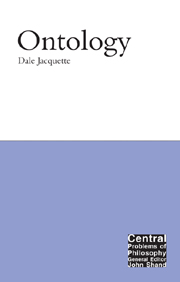Book contents
- Frontmatter
- Contents
- Preface
- Acknowledgements
- Introduction: Being as such
- I Pure philosophical ontology
- 1 What it is to be (on Heidegger)
- 2 Combinatorial ontology
- 3 Why there is something rather than nothing
- 4 Why there is only one logically contingent actual world
- 5 Concepts of existence in philosophical logic and the analysis of being qua being
- II Applied ontology and the metaphysics of science
- Conclusion: scientific–philosophical ontology
- Notes
- Bibliography
- Index
5 - Concepts of existence in philosophical logic and the analysis of being qua being
from I - Pure philosophical ontology
- Frontmatter
- Contents
- Preface
- Acknowledgements
- Introduction: Being as such
- I Pure philosophical ontology
- 1 What it is to be (on Heidegger)
- 2 Combinatorial ontology
- 3 Why there is something rather than nothing
- 4 Why there is only one logically contingent actual world
- 5 Concepts of existence in philosophical logic and the analysis of being qua being
- II Applied ontology and the metaphysics of science
- Conclusion: scientific–philosophical ontology
- Notes
- Bibliography
- Index
Summary
Logic, predication, existence
What can logic teach us about ontology? Symbolic logic in and of itself is not that philosophically interesting, but reveals something important when, appropriately interpreted, it serves to explain why there is something rather than nothing. Logic embodies a set of concepts and philosophical commitments about what it means for something to exist that can be recovered from the expressive capabilities of logic in the predication of properties to objects.
We have argued that logic supports a non-circular a priori answer to the question of being, of why there is something rather than nothing, and why there exists exactly one logically contingent actual world. The rules of formal symbolic logic, concerned primarily with the normative requirements of deductively valid inference, do not entail that any given specimen of actual reasoning conform to its truth-conditions, let alone that any contingently existent entity in the actual world actually exists. Logic seems ontologically impotent in this regard only if we focus exclusively on the inference mechanisms of formal logical systems. For purposes of pure philosophical ontology, there is much more to be learned from the expressive capabilities of classical logic, whether Aristotelian syllogistic, Boolean algebra or modern symbolic first-order predicate logic.
Logic is easily interwoven with pure philosophical ontology because pure philosophical ontology, like logic, is purely formal, and because it is only as a discipline and not as an ontic domain that logic is called upon to answer the Heideggerean question of being.
- Type
- Chapter
- Information
- Ontology , pp. 134 - 154Publisher: Acumen PublishingPrint publication year: 2002

